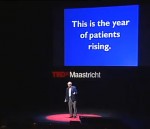Seeing ZocDoc, And Listening To A Panel On Improving Health Care
No word cloud is needed; we were in one. It’s hard not to be charmed by the brightness of delightful, eager tech-workers who want to make it easier for people to get to doctors they might need. In theory. The ZocDoc space bore no semblance to any hospital or office where I’ve been a doctor or a patient.

